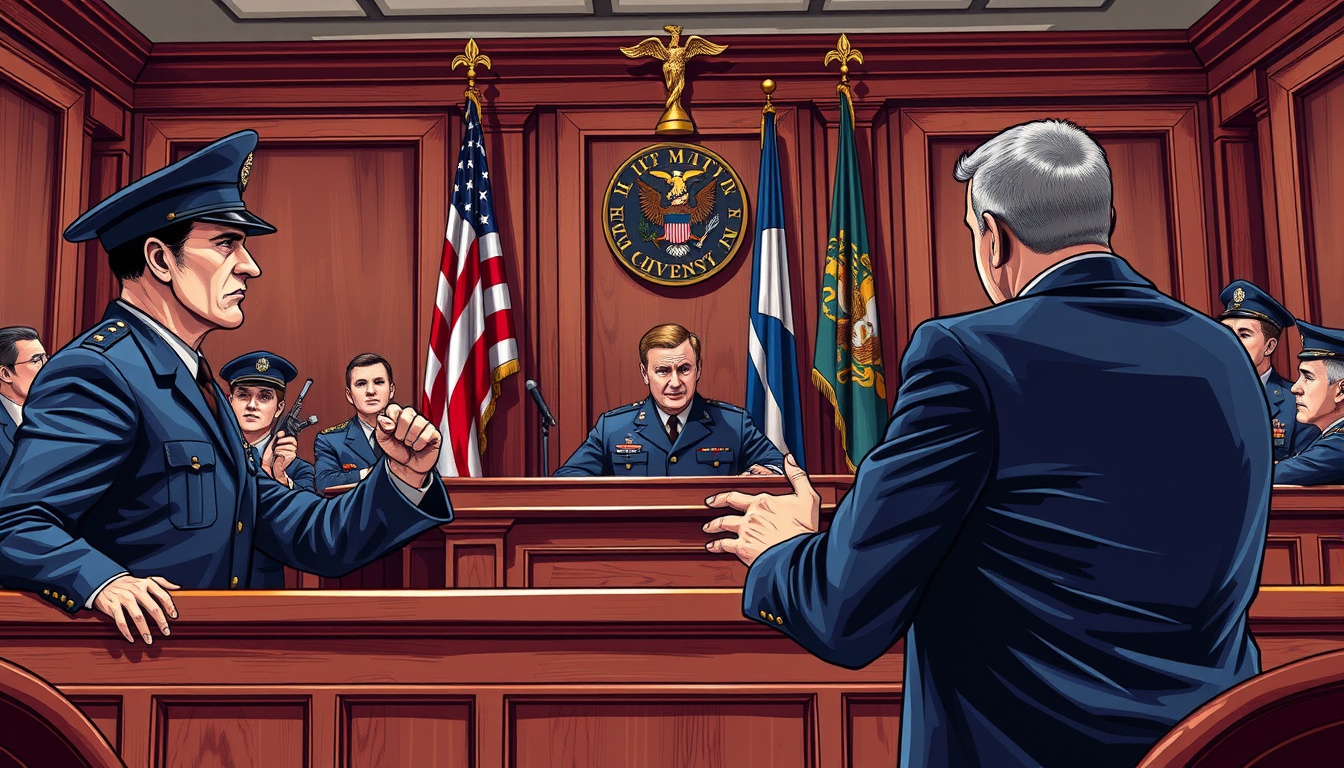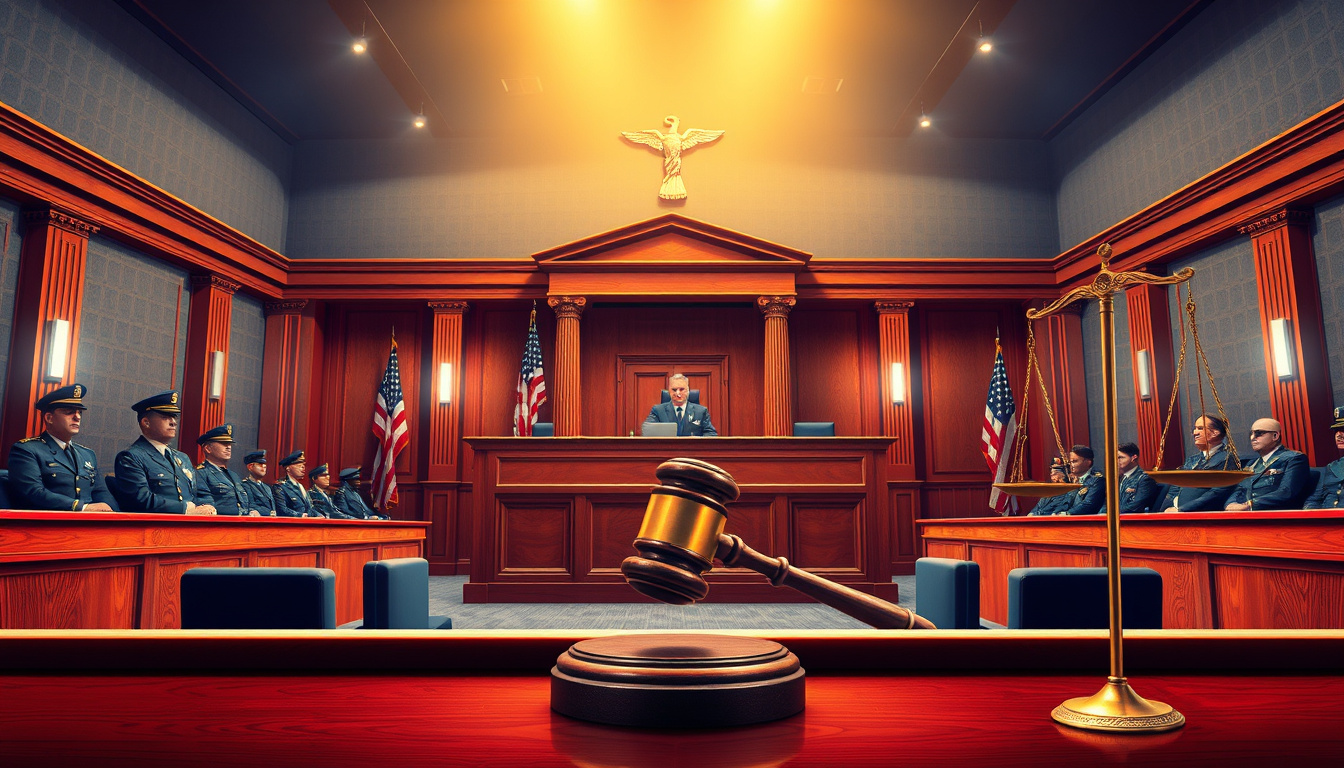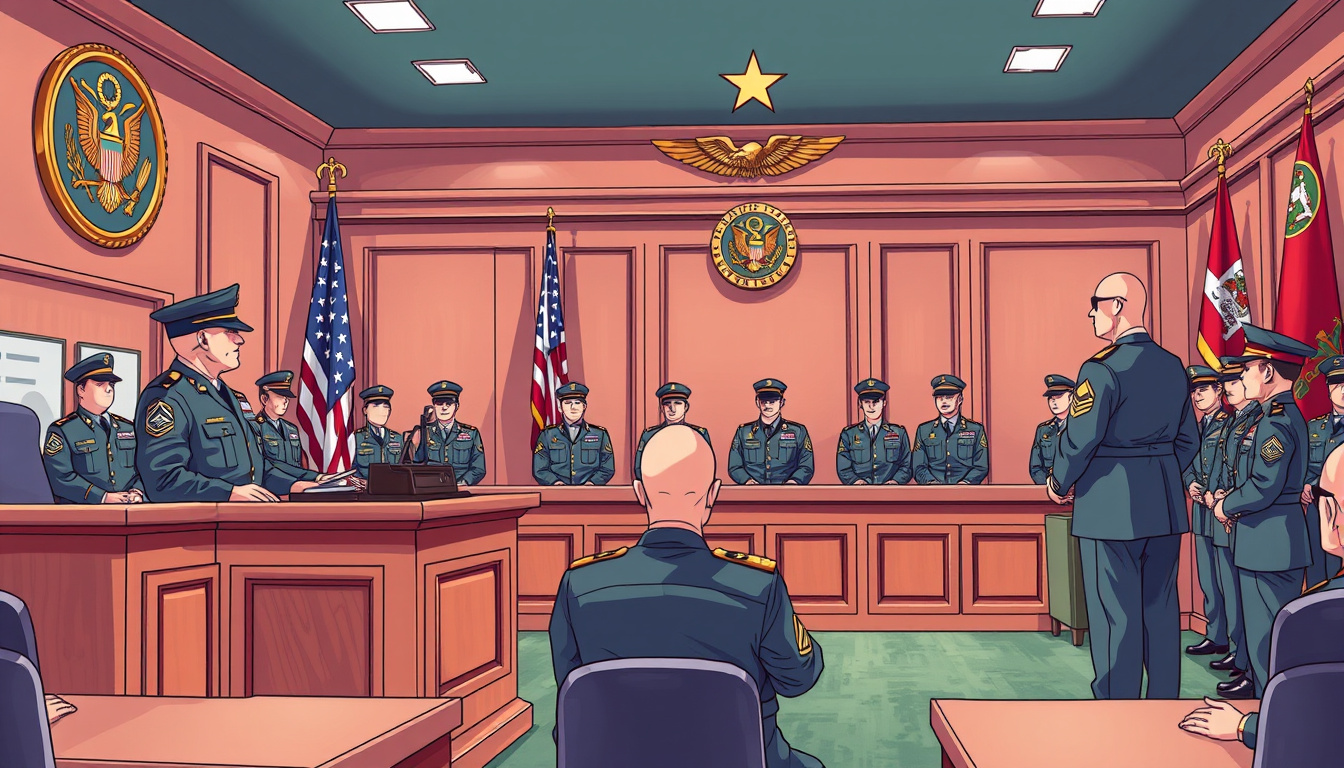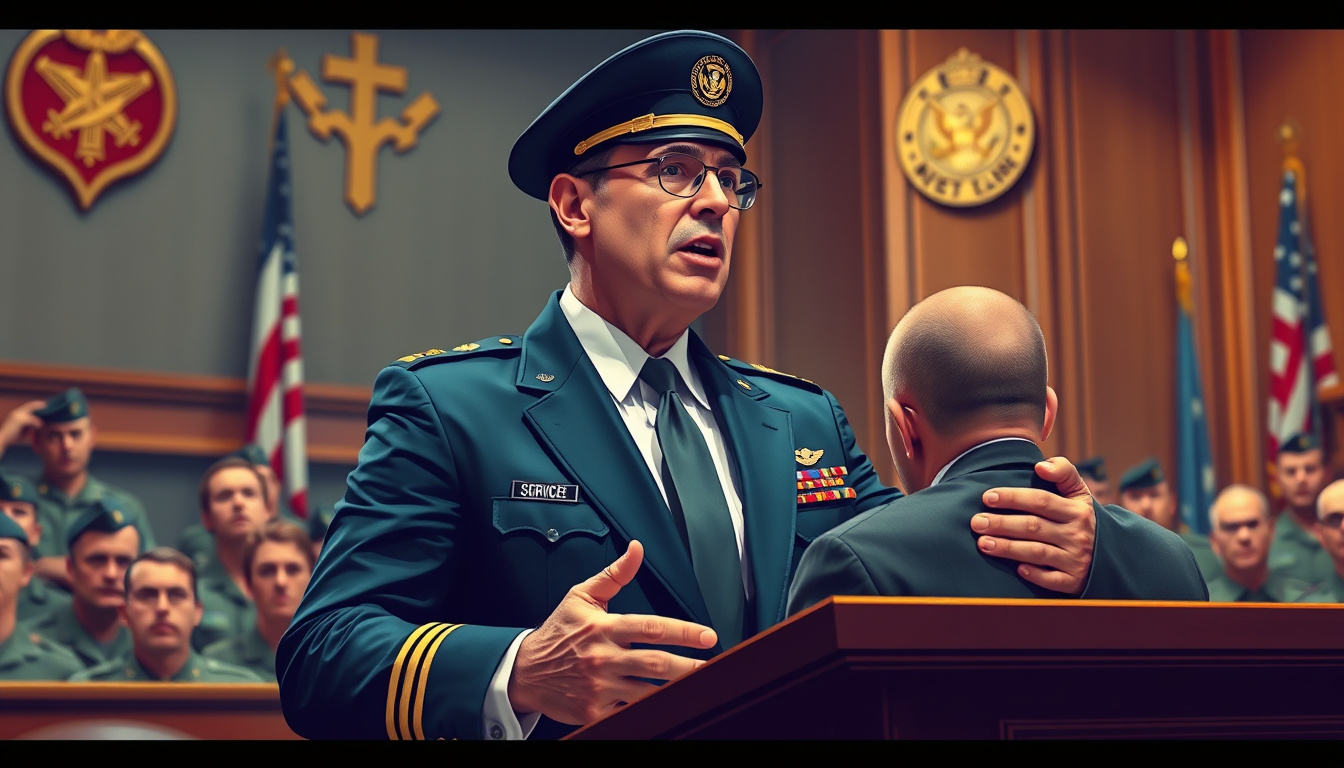Facing a court martial can be one of the most daunting experiences for military servicemembers and their families.
It is essential to understand the complexities involved in military justice, especially when allegations of misconduct arise.
Court martial lawyers play an integral role in navigating the intricate legal landscape of the military justice system, ensuring that your rights are protected, and that you receive a fair trial.
In this comprehensive guide, we will explore the definition and purpose of court martial, the crucial role of court martial lawyers, differences between court martial and civilian trials, common cases heard, the court martial process, how to choose the right lawyer, and the significance of having legal representation in military justice matters.
Whether you are facing allegations or are simply seeking information for future reference, this article aims to empower you with the knowledge needed to make informed decisions.

Key Takeaways
- Court martial is a military judicial process designed to enforce discipline and justice within the armed forces.
- Court martial lawyers play a crucial role in defending service members against military charges and navigating the legal complexities involved.
- There are significant differences between court martial proceedings and civilian trials, particularly regarding rules of evidence and potential outcomes.
- Common types of cases in court martial include offenses like desertion, assault, and conduct unbecoming of an officer.
- Choosing the right court martial lawyer is essential for effective representation and can significantly impact the outcome of a service member’s case.
Understanding Court Martial: Definition and Purpose
A court martial is a judicial court consisting of military members that is convened to try members of the armed forces for offenses against military law, primarily governed by the Uniform Code of Military Justice (UCMJ).
The purpose of a court martial is to maintain discipline and order within the military ranks, ensuring that service members adhere to legal standards that govern their conduct.
These proceedings are essential for upholding justice in the military justice system and serve as a means to penalize those who violate military law.
Court martial lawyers play a crucial role in this process, representing service members during these proceedings.
They provide legal counsel and defense, helping ensure that their clients receive fair treatment under the UCMJ.
Understanding the nature of court martial and the function of court martial lawyers is vital for military servicemembers and their families, especially in times of distress involving criminal allegations or administrative separations.
The Role of Court Martial Lawyers
When military servicemembers and their families find themselves facing the potential of a court martial, the importance of having experienced court martial lawyers cannot be overstated.
These legal professionals are specifically trained to navigate the complexities of military law, ensuring that the rights of the accused are protected throughout the judicial process.
Court martial lawyers specialize in understanding the Uniform Code of Military Justice (UCMJ), which governs the legal proceedings for military personnel, ranging from minor offenses to serious criminal allegations.
Their expertise allows them to effectively defend servicemembers against charges, providing both legal counsel and representation during trials.
Furthermore, a skilled court martial lawyer can help mitigate the repercussions of administrative discipline or administrative separation, offering strategies that might lead to more favorable outcomes.
This targeted support is crucial for servicemembers who are often under immense pressure and facing life-altering consequences.
With a deep understanding of military procedures and the specific nuances of UCMJ violations, court martial lawyers serve as advocates for justice, ensuring that those who have served their country receive fair representation and an opportunity for clarity in tumultuous legal situations.
‘Injustice anywhere is a threat to justice everywhere.’ – Martin Luther King Jr.

Key Differences Between Court Martial and Civilian Trials
When servicemembers face serious allegations, understanding the legal landscape is crucial.
One of the significant distinctions in military law lies between court martial and civilian trials.
A court martial is a military court that hears cases involving violations of the Uniform Code of Military Justice (UCMJ), whereas civilian trials occur under state or federal law.
A key difference fundamentally revolves around jurisdiction—court martial deals specifically with military personnel, including active duty, reserves, and even retired members in certain cases, while civilian courts address the broader population.
Court martial lawyers specialize in navigating this unique legal environment, as they must be well-versed in military regulations and operational protocols that govern military life.
Other differences include the severity of potential penalties; court martial can result in punitive discharges and confinement, while civilian judicial outcomes may vary significantly based on state laws.
Procedurally, courts martial typically have a more streamlined process, but they also afford unique rights to the accused, such as representation that differs from traditional public defenders in civilian court.
Knowing these differences helps military servicemembers and their families better prepare for what lies ahead during legal proceedings and highlights the importance of hiring specialized court martial lawyers to ensure the best defense.
Common Types of Cases Heard in Court Martial
When military personnel face serious allegations, understanding the types of cases that are typically heard in court martial is crucial.
Court martial lawyers play a pivotal role in defending servicemembers against various charges, guiding them through the complexities of military law.
Generally, cases can be categorized into three main types: summary court martial, special court martial, and general court martial.
Summary court martials are designed to handle minor offenses and typically involve a single officer acting as the judge.
These proceedings usually deal with offenses like minor misconduct, ensuring swift adjudication for less serious violations of the Uniform Code of Military Justice (UCMJ).
Special court martials have a more formal setup, including a military judge and a panel of officers or enlisted members.
This court usually addresses intermediate-level offenses, which might result in more severe penalties, such as confinement or dishonorable discharge.
General court martials, on the other hand, handle the most serious offenses such as felonies.
Here, the military servicemember can face significant consequences, including lengthy prison sentences and potential discharge from service.
Effective representation by experienced court martial lawyers is crucial at every stage of these proceedings to navigate the legal landscape and protect the rights of servicemembers.
These professionals provide critical support, analyzing evidence, formulating defense strategies, and advocating for the accused throughout the court martial process, regardless of the case type.

The Process of Court Martial: Step-by-Step Overview
Facing a court martial is a serious matter for military servicemembers and their families.
It is essential to understand the intricacies of the court martial process to navigate it effectively.
Here’s a detailed step-by-step overview of what to expect when involved in a court martial, and how court martial lawyers can assist throughout this journey.
Step 1: Investigation Phase
The process typically begins with an investigation when allegations of misconduct arise.
Military police or investigative agencies may gather evidence and interview witnesses.
During this phase, it’s advisable to seek the counsel of court martial lawyers who specialize in military law to ensure that your rights are protected from the outset.
Step 2: Charge Sheet Preparation
Once the investigation is concluded, the commanding officer will decide whether charges should be brought against the servicemember.
A charge sheet is then prepared, detailing the specific offenses under the Uniform Code of Military Justice (UCMJ).
At this stage, court martial lawyers can review the charges and advise servicemembers on potential defenses.
Step 3: Preferral of Charges
The charges are formally preferrred by the unit commander, moving the case into the court martial system.
The defendant has the right to consult with court martial lawyers during this phase to assess the strength of the prosecution’s case and to formulate a legal strategy.
Step 4: Article 32 Preliminary Hearing
Before a general court martial can proceed, an Article 32 hearing may take place.
This hearing is similar to a grand jury proceeding and is an opportunity for a thorough examination of the evidence.
Court martial lawyers represent their clients here, arguing for dismissals or reductions of charges based on the evidence.
Step 5: Referral to Court Martial
If the evidence warrants it, the case will be referred to either a special or general court martial.
At this juncture, it becomes imperative to have knowledgeable court martial lawyers who can guide the servicemember through complex legal proceedings.
Step 6: Court Martial Preparation
Preparation for the court martial involves collecting evidence, interviewing witnesses, and crafting a defense strategy.
Court martial lawyers will crucially play a role in this phase by identifying potential defenses and building a strong case.
Step 7: The Court Martial Trial
The actual trial consists of the presentation of evidence, witness testimonies, and legal arguments.
The counsel provided by court martial lawyers is indispensable as they advocate for their client’s interests, cross-examine witnesses, and challenge the prosecution’s case.
Step 8: Verdict and Sentencing
Once both sides have presented their cases, the court will deliberate and reach a verdict.
If found guilty, sentencing will occur shortly after.
Court martial lawyers can negotiate terms of sentencing and present mitigating factors that may influence the outcome.
Step 9: Appeals Process
If the verdict is unfavorable, servicemembers have the right to appeal the decision.
This is where the expertise of court martial lawyers becomes essential again as they can navigate the appeals process and work on submitting briefs that argue for a reversal or reconsideration of the decision.
Conclusion
The court martial process can be overwhelming for military servicemembers and their families.
However, by understanding each step and securing the services of experienced court martial lawyers, servicemembers can better protect their rights and prepare a robust defense against allegations that could significantly impact their future.
Whether it involves criminal allegations or administrative discipline, legal counsel is crucial in standing up against the complexities of military law.
How to Choose the Right Court Martial Lawyer
Choosing the right court martial lawyer is a crucial step for military servicemembers and their families facing serious allegations under the Uniform Code of Military Justice (UCMJ).
The stakes are incredibly high during this process, with potential consequences that can impact your career, reputation, and freedom.
When selecting among available court martial lawyers, consider several factors to ensure that you secure the best representation for your situation.
First, prioritize finding a lawyer with specific experience in military law and court martial cases.
This specialization is critical as military law differs significantly from civilian criminal law, and a knowledgeable attorney will understand the intricacies of the UCMJ.
Look for lawyers who have handled cases similar to yours, demonstrating a successful track record in defending clients against court martial charges.
Additionally, assess the lawyer’s familiarity with the military branch relevant to your case.
An attorney well-versed in the traditions and regulations of the Army, Navy, Air Force, Marine Corps, or Coast Guard will be more adept at navigating the nuances of military justice.
Moreover, consider the lawyer’s communication style and approach.
You want someone who listens to your concerns, explains the legal options clearly, and instills confidence in their advocacy.
It may also be beneficial to read reviews and testimonials from previous clients to gauge the level of satisfaction and success.
Lastly, discuss fees and payment structures upfront to avoid any surprises later on.
Make sure you understand what services are included, and seek a court martial lawyer who offers fair and transparent pricing.
By taking the time to choose the right legal representation, you give yourself the best chance at a favorable outcome in your military judicial proceedings.

The Importance of Legal Representation in Military Justice
Navigating the complex landscape of military justice can be a daunting experience for servicemembers and their families, particularly when facing a court martial or allegations under the Uniform Code of Military Justice (UCMJ).
In such critical situations, the importance of having skilled court martial lawyers cannot be overstated.
These legal professionals specialize in representing military personnel in disciplinary proceedings, ensuring that their rights are protected and that they receive a fair trial.
Court martial lawyers not only bring expertise in military law but also experience in the nuances of each branch’s regulations and procedures.
This specialized knowledge is vital because the stakes are extraordinarily high—convictions can lead to severe penalties, ranging from loss of pay to dishonorable discharge, which can have lasting consequences on a servicemember’s career and personal life.
By hiring court martial lawyers, servicemembers can ensure they are adequately defended against allegations of misconduct, whether they involve serious criminal charges or administrative actions that could jeopardize their military careers.
Furthermore, these attorneys adeptly navigate the courtroom, providing candidates for defense with robust strategies that can mitigate potential penalties and protect their futures.
It’s essential for servicemembers to act swiftly in securing legal counsel, as waiting too long can limit options for defense and decrease the likelihood of a favorable outcome in court martial proceedings.
Frequently Asked Questions
What is a court martial?
A court martial is a military court that tries members of the armed forces for offenses under military law.
Its purpose is to ensure discipline and uphold the legal standards within the military.
What do court martial lawyers do?
Court martial lawyers represent servicemembers during court martial proceedings.
They provide legal advice, craft defense strategies, and advocate for their clients’ rights throughout the trial process.
How does a court martial differ from a civilian trial?
Court martial proceedings follow military law and rules of evidence, which can differ significantly from civilian trials.
Additionally, the types of offenses heard, the jury composition, and the potential punishments can vary between the two systems.
What types of cases are commonly tried in court martial?
Common types of cases heard in court martial include serious offenses such as desertion, theft, assault, and conduct unbecoming an officer, as well as specific military-related crimes.
How can I choose the right court martial lawyer for my case?
When choosing a court martial lawyer, consider their experience in military law, track record in court martial cases, communication style, and testimonials from previous clients.
It’s vital to select someone who understands the unique complexities of military justice.
If you or a loved one is under investigation or facing charges under the UCMJ, don’t wait to protect your future. Contact Gonzalez & Waddington, Attorneys at Law. Our battle-tested military defense lawyers have successfully defended service members worldwide against the most serious military offenses. Call us today for a confidential consultation and put our elite military defense attorneys in your corner.
Related Posts
- Video: MCAS New River Article 120 UCMJ Military Defense Lawyers – Court Martial Attorneys
- Video: Kleine Brogel Air Base Military Defense Lawyers – Belgium Court Martial Attorneys Article 120 UCMJ
- Understanding Article 107 UCMJ: Navigating False Official Statement Charges in Sexual Assault Cases
- Camp Red Cloud Military Defense Lawyers



